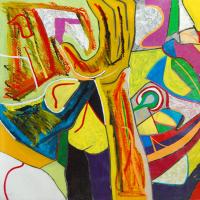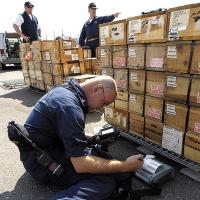Shchedrovitsky thinking. Shchedrovitskiy organizational and managerial thinking: ideology, methodology, technology. P. G. Shchedrovitsky. Foreword
Once, after 1961-1962, he formulated this in a discussion with me very accurately and directly: “Georgy Petrovich, you are talking nonsense. There are people who think, but there is no thinking and there is no activity. " People are reality, and people sometimes think, sometimes act, sometimes love. This is reality. Psychologism here is expressed philosophically very precisely: psychologism is an idea of realities, namely, that there are people who can love, and can think, damn it! This is nonsense, from my point of view, because the world is existence in essence. And in this sense, thinking really exists - as a substance, regardless of whether there are people or not.
Then, a few years later, Vitaly Yakovlevich Dubrovsky formulated this very accurately. He said: "People are casual carriers of thinking." You can implement thinking in humans, or you can implement mixed systems of people and machines. The main thing is that there is thinking, and on what it is realized - it does not matter. In our world - by accident - in humans, in another world - on penguins, and in the third - like in Lema, on pieces of iron ... it is necessary to understand that the world of people, or people as such with their psychology, is a secondary world, the realization of the world of thinking and activity, and if we want to understand and represent all this in a natural way, we must consider the world of thinking and activity, and not the world of people, since people are random epiphenomena of the world of thinking and action [...] I would say that the main fraud is the idea of a person with his psyche, and the second fraud is the idea of the subject, the opposition "subject-object" [. ..] this scheme is the greatest fraud of the last 800 years of European culture (since the culprit is Abelard, and this is 1147 or somewhere in this area, and everything that followed was largely a hoax) [...] must and must work in the scheme of subjectlessness: you have a thinking that lives by its own laws and unfolds in special mechanisms ... And when these very signs, "carrots" (symbols of individuals or their positions - Vadim Rozin), then I am doing a very important procedure by doing this - I bring the individual onto the board and alienate him. He is now a moment of objectivity, and I consider how he lives there, outside of me [...] he should become what the Germans call Gegenstand, that is, "opposing me" [...] And I, as a thinker , must draw an ontological picture of objectivity. And the content of my thought is set by what I have drawn. Therefore, the most important point here is the eradication of oneself, of subjectivity [...] So, the main problem that arose then, in the 50s - it sounds very abstract, I would even say scholastic, I am not afraid of this word - this is the problem: so where does man exist? Is it an autonomous whole or is it just a particle inside a mass moving according to the laws of this mass? This is one form of this question. The other is creativity. Does it belong to an individual or does it belong to a functional place in human organization and structure? I answer this question very harshly: of course, not an individual, but a functional place! [...] A simple thing is asserted: there is a certain culture, a body of knowledge that is transmitted from generation to generation, and then a person is born - orthogonally to all this, and either he will be connected to this very spirit, make the spirit accessible, or not connect [...] I said that thinking was put as a new reality in the world, a reality separate from the reality of matter and opposing it. And it was stated that this is a special substance that exists in the socio-cultural space. Thus, psychologism, or naturalism, was overcome.And this, I say, is again the most important opposition, decisive, from my point of view, the fate of the 20th century and the next two or three centuries, since the interpretation of thinking as an emanation of man and human consciousness is, according to to my deep conviction, the greatest delusion of European history. And this is what makes us idiots today and hinders our development. "
At the first readings dedicated to the memory of Georgy Petrovich Shchedrovitsky, I already drew attention to a kind of paradox demonstrated by the founder of the Moscow Methodological Circle (MMK). On the one hand, in his, in fact, his last interview, Shchedrovitsky argued that he is just a servant of thinking, a substrate through which thinking realizes itself and develops, that in general he personally feels thinking not as his own ability, but as a Plato rider, firmly seated on Shchedrovitsky-man and managing him. And this, Shchedrovitsky insisted, is precisely the happiness of the thinker, and not in some kind of self-realization of the personality, which, perhaps, is nothing more than a phantom of our consciousness. In order not to be unfounded and at the same time to be precise, I will allow myself one more quote. “From all sides,” says Shedrovitsky, “I hear: a person! .. personality! .. All this lies: I am a vessel with living, self-developing thinking, I am thinking thinking, its hypostasis and materialization, the organism of thought. And nothing else ... I mean one thing all the time: I am a bollard, a servant of my thinking, and then there are actions of thinking, mine and others, which, in particular, communicate. At some point - I was twenty years old then - I felt amazing transformation what happened to me: I realized that thinking has sat down on me and that this is my value and my essence as a person. " So, it is not G.P. who thinks, acts and communicates. Shchedrovitsky, and his and other thinking. Shchedrovitsky himself is only "hypostasis and materialization, an organism of thought."
But on the other hand, and I tried to show this at the Readings (besides, I am sure that for those who personally knew Georgy Petrovich, this idea is obvious), the creator of the MMK was a bright personality, and it was his personality that predetermined many features of thinking not only Shchedrovitsky himself, but also his colleagues during the “heroic period” of MMK's activity in the 60s and early 70s. It is also quite obvious to me that it was not some kind of thinking that sat down on Shedrovitsky that communicated and thought, but we together and separately: Yura Shchedrovitsky. Nikita Alekseev, Volodya Kostelovsky, Vasya Ladenko, Volodya Lefebvre, Boris Sazonov, Oleg Genisaretsky, Alina Moskaeva, Vadim Rozin.
At the same time, I cannot but admit that I understand, feel what Shchedrovitsky writes about so paradoxically and defiantly. Yes, indeed, and I myself sometimes catch myself thinking (or perhaps feeling) that it is not I who think, but someone else, not even a person, but something cosmic, supra-individual. However, much more often, of course, I experience vivid sensations of the realization of my own personality, my own thinking. But sensations are sensations, and it would be strange to ascribe experiences, even if so unusual, not only to reality, but also to personally personify them, like in the Rose of the World. Daniil Andreev not only with their own feelings, but also with thoughts (ideas). It is better to leave both of these statements (the person thinks, and only she, and the other - with the help of the person, some supra-individual thinking thinks) as members of the mental antinomy, but the antinomy is important for us, indirectly, in fact, indicating a certain reality. "
Rozin V.M., Thinking and creativity, M., "Per's", 2006, p. 21-23.
The Moscow Methodological Circle (MMK) is a philosophical-methodological and intellectual-practical school of Georgy Petrovich Shchedrovitsky - "GP", as many students called him.
The circle arose in the early 1950s and finally took shape in 1954 during a discussion on the problems of logic at the Faculty of Philosophy of Moscow State University. It was originally known as Moscow Logic Circle (MLK). The founding fathers of MLK - A.A. Zinoviev, G.P.Schedrovitsky, B.A.Grushin and M.K. Mamardashvili.
In 1958, after a disagreement with A.A. Zinoviev, the ideological and organizational leader of the Circle was G.P. Shchedrovitsky, and the Circle itself was named Moscow Methodological... Now the students of the State Enterprise have created independent organizations that continue the traditions of the intellectual work of the Circle, and the MMK has turned into a wide methodological movement.
Followers of the Shchedrovitsky school - participants in the methodological movement - are developing in cultural studies, theory of law, theory of sociocultural systems, in the methodology of education and science, methodology of social change, design educational systems, work in financial and organizational management consulting, in structures strategic development local and state authorities.
The school has developed an original approach to the analysis of the widest range of socio-cultural and intellectual phenomena - the system-thinking activity approach. An outstanding achievement of the State Enterprise and its students is the creation of a fundamentally new socio-cultural practice - organizational and activity games, which are a unique tool for the analysis and development of almost any systems of thought activity - organizations, intellectual directions, programs and projects, etc.
During the life of the GP for more than 30 years, the center of the intellectual life of MMK was methodological seminars, which were led by Georgy Petrovich himself. After the seminars stopped working in 1987 for various reasons, the GP strove to support the organizational and ideological unity of the Circle by holding methodological congresses. The first such congress (at first it was modestly called a “meeting”) took place in Kiev in January 1989. There were 5 congresses in total.
Already at the first methodological congresses it became clear that the MMK is turning into a methodological movement - devoid of the previous organizational forms of unity, but held together by an intellectual tradition, a common school and the figure of the Teacher - G.P. Shchedrovitsky.
After the death of G.P. Shchedrovitsky, attempts to co-organize the methodological movement resulted in the holding of methodological congresses. In total, 2 congresses were held - in 1994 and 1995. And since 1996, Readings in memory of G.P. Shchedrovitsky.
In 1991-1999, the journal "Questions of Methodology" was published, and from 1990 to the present day, the methodological almanac "Centaur" has been published
The main difference between play instrumentalism and other approaches and technologies for mastering managerial skills is that it has its own “instrumental workshop” built into it. In other words, a student who masters this approach acquires the ability to make the necessary tools for him according to the situation (ad hoc - in this case).
This requires:
Take the "student" position;
Learn to work with an arsenal of management ideas, schemes, tools that humanity has developed (Scheme 30);
Understand the basic structure and boundaries of the use of tools for managerial thinking activity (Figure 31).

A few words about this last one, but important work... I took the risk of doing the experience of sketching a general picture of the genesis of the tools of management thought and activity (Figure 30). It is quite extensive and yet obviously incomplete. Its design assumes the ability to add and remove authors, ideas, schemes, reorganize the structure as a whole at its discretion.
And generally play.
In this case, willy-nilly, you will have to read something, remember something, think about something. And this means - to embark on the path of historical and cultural research. Something will definitely remain in the toolbox.
The scheme is multi-layered and deployed along the time axis. Layers from bottom to top represent locations:
For practical and methodological descriptions of management activities - Situations of decision making and Accumulation of experience;
For experiences of grasping the essence of management activity in theoretical models and constructions - Activity;
This division is rather arbitrary and is necessary only for the primary open storage of ideas and the names of their creators for the purpose of operational use. Fixing individual names, ideas, schools in different top-places of the scheme allows you to simultaneously "look at them" and tie them into the structure necessary for the case. Those interested in names can compose an anthology. Those interested in ideas can design tools.
Securing the idea behind the name presupposes, as a logical continuation, the keeping of the name by the forces of a group of successors. Translation tasks require the formulation of an idea (a body of ideas) in the form of a discipline and placement in the appropriate subspace of culture, where similar units are placed on the shelves according to the rubricator.
Good luck.
A.P. Zinchenko
LITERATURE
Thinking, Activity and Thought Activity Research Program
1. G.P. Shchedrovitsky Fav. works. - M., 1995.
2. G.P. Shchedrovitsky Philosophy. The science. Methodology. - M., 1997.
3. G.P. Shchedrovitsky Technology of thinking // Izvestia. - 1961. - No. 234.
4. G.P. Shchedrovitsky Scheme of thought activity - systemic-structural structure, meaning and content // System research: Yearbook. 1986. - M., 1987.
Basic schemes and concepts of the ORU methodology
1. G.P. Shchedrovitsky OSU (1). Organizational and managerial thinking: ideology, methodology, technology: A course of lectures // From the archive of G.P. Shchedrovitsky. - T.4. - M, 2000.
2. G.P. Shchedrovitsky OSU (2). Methodology and philosophy of organizational and managerial activity: basic concepts and principles // From the archive of G.P. Shchedrovitsky. - T.5. - M., 2002.
3. G.P. Shchedrovitsky Problems of system research methodology. - M., 1964.
4. G.P. Shchedrovitsky Build problems systems theory complex "popular" object // System Research. Yearbook. 1975 .-- M. 1976.
5. G.P. Shchedrovitsky Principles and general scheme methodological organization of systemic-structural research and development // System Research. Methodological problems: Yearbook. 1981 .-- M., 1981.
6. G.P. Shchedrovitsky Scheme of thinking activity - systemic-structural structure, meaning and content // System research. Methodological problems: Yearbook. 1986 .-- M., 1987.
Knowledge in management: practical and methodological, historical, natural science (about objects), technical, methodological
1. G.P. Shchedrovitsky The system of pedagogical research (methodological analysis) // Pedagogy and logic. - M., 1993 (1968).
2. G.P. Shchedrovitsky The beginning of the systemic and structural study of the relationship of people in small groups // From the archive of G.P. Shchedrovitsky.-T.3.-M., 1999.
3. G.P. Shchedrovitsky Initial concepts and categorical means of the theory of activity // Development and implementation automated systems in design (theory and methodology). - M., 1975.
Experimental practice of ORU methodology
1. G.P. Shchedrovitsky Design automation and development tasks of design activities // Development and implementation of automated systems in design (theory and methodology). - M., 1975.
2. Shchedrovitsky G.P., Kotelnikov SI. Organizational-activity game as a new form of organization and method of development of collective thinking activity // Innovations in organizations: Proceedings of the seminar at the Research Institute of System Research.
Georgy Shchedrovitsky
Organizational thinking: ideology, methodology, technology
Course of lectures 3rd edition, revised and enlarged
Publishing House of Art. Lebedev Studio
Responsible editor P. G. Shchedrovitsky
Editors G. A. Davydova, A. V. Rusakov
This book is the third edition of the course of lectures on management by G.P. Shchedrovitsky (1929–1994), a Russian thinker, philosopher, methodologist and public figure... The author believes that the activities of organization and management are leading for the development of any practical area. The source of the principles of the methodological school of management is a deep theoretical and ontological study of organizational and managerial thinking. The knowledge and ideas that the methodology operates with have the character of prescriptions for action or projects of organizing activities (or thinking). Particular attention in the lectures is given to systematic approach developed in the Moscow Methodological Circle.
The book is intended for specialists in organization, management and leadership, for undergraduate and graduate students of all specializations in the field of management.
© NSF “Institute of Development named after G. P. Shchedrovitsky ", main text, 2005
© P. G. Shchedrovitsky, foreword, 2014
© G. A. Davydova, A. V. Rusakov, editors' foreword, notes, index of names, 2014
© A. V. Rusakov, literature, 2014
© Art. Lebedev Studio, design, 2014
P. G. Shchedrovitsky. Foreword
I go up the escalator of the Paveletskaya metro station, jump out into the street and, squinting from the sun, run to the passage across the Garden Ring. On the opposite side of Sadovoye, near the bridge over the Moskva River, there is a typical Soviet building - it looks like it was 1930s, made of brick, painted with yellowish paint. The Institute for Advanced Studies of the USSR Ministry of Energy is located here. It is here that the lectures of my father, Georgy Petrovich Shchedrovitsky, and the organizational activity game devoted to management problems will begin today. Outside - May 1981.
Situation
In the Soviet Union, plans for the construction of nuclear power plants (NPPs) began to expand significantly since the late 1960s. Party and government documents, including the 1980 decree, provided for the commissioning of 66.9 million kW from 1980 to 1991, as well as the creation of the necessary civil infrastructure nuclear power to provide the NPP with a total capacity of 100 GW. The active promotion of domestic nuclear technologies to the markets of the countries of Eastern and Northern Europe continues.
In the periods immediately preceding and following the reading of Georgy Petrovich Shchedrovitsky's lectures at the IPK of the Ministry of Energy, a number of significant events take place in the nuclear industry.
On April 8, 1980, the launch of the third block took place Beloyarsk NPP, the construction of which lasted almost 13 years. In June 1981, the operation of the first unit of the Beloyarsk NPP ends ahead of schedule. After the accident in December 1978, the fate of the first and second blocks was actively discussed and scenarios for the development of the site as a whole were being developed. Later Georgy Petrovich and members of his team were involved in these discussions.
As the scale of construction of new power units increased, numerous problems of serial construction of nuclear power plants became more and more acute. Despite the development going on during this period and further adoption in 1982 on the basis of the accumulated experience of "mandatory technological rules power unit construction ”(the so-called OTP-82), which were focused on the serial construction of nuclear power plants, these terms were violated everywhere and in fact the pace and quality of construction depended largely on the quality of management of a particular facility.
In the seventh lecture, Georgy Petrovich, losing his patience, reads an excerpt from the report of the government commission on the results of checking the construction progress at the Kalinin nuclear power plant.
“… At our construction site,” Georgy Petrovich quotes, “the plan for commissioning capacities has not been fulfilled for many years… The main disadvantages of the construction of energy facilities are insufficient concentration and dispersion. capital investments, increase against the standard duration of construction, uneven commissioning of capacities during the year, uneven workload of workers and equipment, slow growth of labor productivity. The construction results are negatively affected by the backlog of the Ministry's own industrial base, chronic non-observance of the principle of advanced construction of residential buildings, social and cultural facilities ”.
Thus, the issue of construction management at that moment was extremely acute, which set the applied direction of the work, which was carried out by the IPK of the Ministry of Energy with a reserve of personnel.
It should be said that from March 30 to April 4, 1981, at the request of the director of Beloyarskaya nuclear power plant Georgy Petrovich Shchedrovitsky conducts Vadim Mikhailovich Malyshev in the town of Zarechny Sverdlovsk region organizational and activity game "Ensuring the normal functioning and development of technologies and activities at nuclear power plants." One of the consequences of the game was the involvement of Georgy Petrovich in discussing the situation in the industry and inviting him as a lecturer at the IPK of the Ministry of Energy to work with the personnel reserve.
Situation
Georgy Petrovich reads lectures in parallel with the game. The game is called "Assumption of the position of the head of the NPP construction department." A little later, Georgy Petrovich will play another game with the reserve of personnel of the IPK of the Ministry of Energy - “Programming social development NPP construction team ”.
The personnel reserve of the Ministry of Energy was a rather heterogeneous and uneven-aged team. As far as I remember, there were only two real heads of construction departments among the listeners of the 1981 summer stream. Most reservists are deputies, both line and functional. But there were also several specialists at the lower levels of the notorious Soviet vertical of management, who, as is often the case in the practice of advanced training and retraining, were sent at the last moment to replace deputies from those construction sites where, as always in the summer months, " rush job ".
“A scientist can be a dogmatist, a scientist can be, forgive me, stupid, and he will remain a scientist,
and a leader cannot be stupid - he will not remain a leader. "
It is very difficult to write a review on this magnificent book - no matter how much you say or quote, it still seems that it is not enough. Therefore, a short review is this: if you consider yourself a manager, especially a project manager, and at the same time are taught to read and write.
And with Shchedrovitsky, it's a different story: he is from a different cultural environment, he is from the last century, he was brought up on different values, he thinks differently from the way we are used to, he says not what we expect and he is not worried about the questions that can be easily answered. find the answer on the Internet. Shchedrovitsky's book is like a breath of fresh air. It is as out of the line as possible from the same line of business books. No disgruntled "my friend Seth Godin", no mention of Jobs and Croc, no baseball stories. The beauty.
Despite the fact that Shchedrovitsky gives many examples from life, and conducts business games in parallel, this is not an instruction book. Those who want to quickly find ready-made solutions to pressing everyday problems in it will probably be disappointed. The value of Shchedrovitsky's book lies elsewhere - it forms a person's managerial thinking, teaches him to think in a new way. She helps him look at work from a managerial point of view and shows how to keep this angle of view. If you like, Shchedrovitsky's book is a philosophy of management, but the philosophy is practical, very integral. It will not replace the story of a modern practitioner (there is not a word about the fight against tax), but it will well complement it and will become an excellent basis for the development of practical ideas and real actions.
The book is a storehouse of interesting ideas. For example, Shchedrovitsky pays special attention to the difference between the concepts of "organization", "management" and "leadership". Look here:
“I will continue to discuss the organizational work in more detail. And then I will ask why the organizer created the organization, whether the organization corresponds to his goals and the purpose that he attributed to it, or displaces this appointment, begins to live on its own. So far, at the first visit, only one moment is important to me. The organizer refers to a specific set of elements, collects elements of a specific type and kind in specific quantities, combines them and sets specific relationships and relationships between them. When he did this and thus created the structure of the organization - and the structure is set by the arrangement of elements and the type of connections and
relationships - it fades into the background, and this thing can either remain dead, or begin to live by its own laws. And here everything is exactly the same: whether we design a machine tool, a machine, or we build, as you do, a power plant, a nuclear power plant - we organize the organization of all the elements, building blocks, etc., everything that is needed there, all this we collect in a specific order. But when you design a machine, it will either work, or, as is often the case, it will not work. So is the organization.<...>Further, this organization will function either regardless of the goals of the organizer, regardless of what he laid down and foreseen in it, or in accordance with his goals. And whether he will "own" its further functioning or will her life proceed irrespective of him, contrary to his plans, this question is directly related to the organizational
work does not apply. Organizational work is limited to selecting elements, assembling them, and defining certain relationships and relationships. This is what is important for me to confirm for now.
So: selection of elements, assembly of elements, setting certain relations and connections,transforming a set of elements into a whole is a work of organization, in the event that such elements are people - sometimes without machines, sometimes with machines, but it is assumed that people in the full sense of the word: acting people working with certain means.
Now look further. What is management and in what case do we manage? Is it possible, say, to control a chair? […]
- Can.
No, I say. You can put it on, you can move it, you can break it, transform it. It will be some kind of practical, transformative activity. But this is not control every time. Now the more complicated case is the car. Here the car is standing, you have not pressed the accelerator yet - is it possible to drive it?
- No.
It is forbidden. And when does it become possible to drive a car? When she went. Control is possible only in relation to objects that have self-propulsion.<...>Until this self-movement is absent, it makes no sense to set such a task or goal - management.<... >You can imagine a situation where you can control the flight of a chair. Imagine something like a musketeer carnage: someone throws a chair, and instead of defending myself from it, I direct its flight somewhat into another side. I performed a one-time, one-time act of control - I changed the direction of flight of the chair. In this sense, I have managed this process. But look, what did I manage? I flew the chair, not the chair.
And now about the leadership. Leadership is possible only within the organization, within the framework of special organizational ties.
What is the essence of leadership? In setting goals and objectives in front of other elements. But in order for me to be able to set goals and objectives for other elements - people, it is necessary that they abandon their own goals and objectives and undertake to accept my goals and objectives. And that is exactly what happens within the organization.
The organization of people - I go back to the organization and fix its properties and qualities - is always carried out in this way: a person occupying a certain place, thereby refuses his own goals and objectives, from his own self-movement and undertakes to move only in accordance with this place and accordingly goals and tasks that will be transferred to him by higher authorities through the channels of the organization.<...>When people get into an organization, they abandon their own goals and goal-setting functions and undertake - this is the meaning of the statement "Please accept me for the position ..." - to accept assignments, goals, tasks of higher authorities and fulfill them at the expense of their activities.
Now I will take one more step. Since people in office do not always realize that they must give up their goals and objectives, and besides, since there is always very little sense of people who have abandoned goals and objectives, people do not really give up their goals and objectives. ... Or they refuse within certain limits. This is a game like that. They pretend that they are ready to give up some of their goals and accept some other people's goals and tasks, but what in fact is still a question. They can temporarily hide their goals, or, on the contrary, use the execution of tasks to achieve their goals.
And when self-movement begins, leadership becomes either impossible or
is carried out within very narrow boundaries, and there is a need for management. The leader not only leads, but is also forced to manage, because his subordinates never give up their goals, their self-movement entirely. But when they begin to self-propel, then they can no longer be guided. We have to use a different technique - the control technique. "
What does it give us? Here's the thing: governance, organization, and leadership are essential different types activities. Anyone can be involved in the organization - they came, made connections, left. Leadership can only be done in a prepared environment in which you have the authority to do so. If I come now to some company and start giving instructions to employees, they will call security - I have no right to lead there, I have no authority.
If you are the boss of a large state corporation (and even without the prefix state, this is true), then you are in charge and, possibly, organize. But are you in control? Is not a fact. This is one of the curses project management in general - many lead, organize, but do not manage. On the other hand, by gaining experience about management objects, you can manage them, even without being managers, without any authority. And this is the thrill of project management - a manager, not being a leader, manages a moving project, collecting information about people, about the connections between them and influencing them.
This also means that you don't have to be a manager in the company at all, in order to manage, it is enough to grasp these connections, collect information - and you can influence. Great, isn't it?)
The book covers not only general issues management and project management, but also topics related to learning (especially with adult education), it is discussed how science relates to management activities(we are asked not to abuse the scientific approach), it tells whether it is possible to grow a good manager from a specialist ...
Why am I telling you everything? Run to the store!
 How to connect to wifi without knowing the password
How to connect to wifi without knowing the password Internet at school - how it is protected
Internet at school - how it is protected Complete despair: how to survive the storm of life
Complete despair: how to survive the storm of life Application of marking on metal Application of a barcode on a product
Application of marking on metal Application of a barcode on a product Inkjet technology
Inkjet technology Dartsya Tarkovska about a creative career and the phenomenon of DIY
Dartsya Tarkovska about a creative career and the phenomenon of DIY What to make a bird feeder
What to make a bird feeder